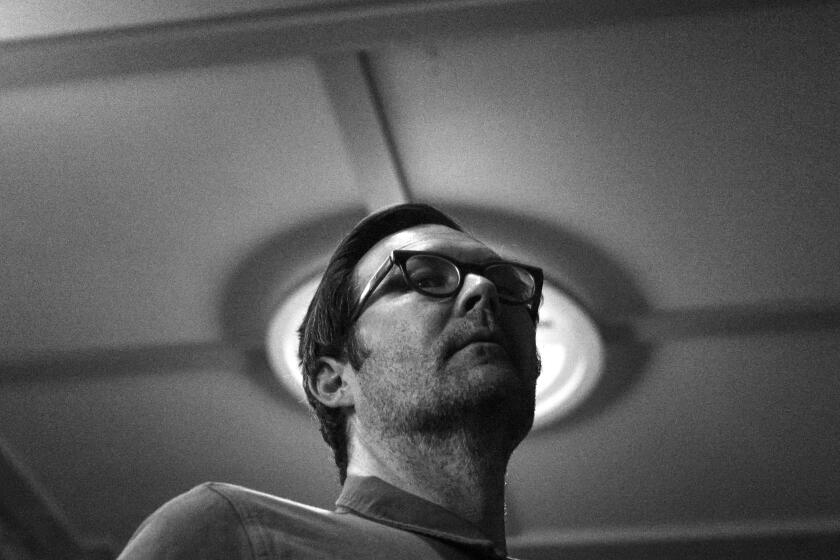Merchant Ivory: There’s Room for Their View
The films of Indian producer Ismail Merchant, California-born director James Ivory and their writer, the German-born novelist Ruth Prawer Jhabvala, are almost invariably literary adaptations, witty and intimate, and reflect their own cross-cultural sensibilities.
The partners are indeed expert at deceptively gentle depictions of cultural confrontations that reverberate quietly with implications. Most of their best films have been made in India, yet their most popular picture, the 1986 adaptation of E.M. Forster’s “A Room With a View,” was made in England and Florence. Their company has had a few failures, but its many successes are marked by an uncommon sophistication, civility and intelligence.
In 1961, Merchant and Ivory contacted Jhabvala in Delhi with the hope of persuading her to let them make a film of her novel “The Householder.” Not only did she agree but adapted it to the screen herself, thus marking the beginning of a writing-producing-directing team that endures to this day. Preceding the June 29 opening of their latest picture, the detective comedy “The Perfect Murder,” the Monica 4-Plex will present a two-week retrospective of 14 Merchant Ivory films (not all of which were written by Jhabvala or directed by Ivory).
The retrospective commences with “The Europeans” (Friday), their exquisite 1979 film of the Henry James novel that concerns the impact of Europeans and Americans of the mid-19th Century upon each other. A gallant and radiant Lee Remick stars as a determined husband hunter. “Quartet” (Saturday), their 1982 film of Jean Rhys’ delicately wrought 1928 novel, captures well the brittle, intense atmosphere of Rhys’ Bohemian, cafe society of the ‘20s and much of her insight, if not quite a full measure of her rigor. Elegant and wry, it is an embittered, impassioned expression of a woman (Isabelle Adjani) at the mercy of her emotions and impoverished state.
Their 1987 “Maurice” (next Sunday) is a well-nigh flawless account of a conventional upper-middle-class young man (James Wilby, wonderfully unaffected) coming to terms with his homosexuality in Edwardian England. It is based on E.M. Forster’s posthumously published 1913 novel.
In bringing John Masters’s novel “The Deceivers” (June 18) to the screen for Merchant Ivory, director Nicholas Meyer and writer Michael Hirst took an all-too-reverent approach to this old-fashioned adventure, which finds Pierce Brosnan going native to expose the murderous thuggee cult in 1820s India.
Merchant Ivory’s 1965 “Shakespeare Wallah” (June 19) helped establish their international reputation. It’s a charming tale in which a playboy (Shashi Kapoor) becomes caught between his mistress, an exotic idol of the Indian cinema (Madhur Jaffrey), and an English actress (Felicity Kendal) who tours India with her parents’ seedy Shakespearean company. In the 1971 “Bombay Talkie” (June 20), another key early film, Ivory and Jhabvala delineate with thoroughness and compassion the ill-fated meeting of a hard-edged, tempestuous best-selling novelist (Jennifer Kendal) and a Bombay movie star (Kapoor), whose popularity is beginning to slip.
For his first American film, Ivory forsook the distinctive delicacy of his Indian films to create in the 1973 “Savages” (June 21) a thunderingly tedious allegory about how thin the veneer of civilization can be; the setting is a bizarre house party between the World Wars. It’s not unlike the current “The Cook, the Thief, His Wife and Her Lover.”
Ivory’s latest release, the 1989 “Slaves of New York” (June 22), which Tama Janowitz adapted from her book of trendy, slight short stories, is also peculiar: a shallow, boring business about arty loft-living lowlifes in which Janowitz’s messy, unfettered savagery tends to overwhelm Ivory. A miscast Bernadette Peters stars.
The airy, delectable 1986 Merchant-Ivory-Jhabvala adaptation of “A Room With a View” (June 23) is perfection itself, a virtually irresistible tale of the flowering of a deceptively demure Edwardian young lady (Helena Bonham-Carter) whose transformation begins in Florence when she witnesses a bloody and random act of violence. Daniel Day-Lewis is a hoot as Bonham-Carter’s insufferably priggish fiance.
The 1983 “Heat and Dust” (June 24) draws us into a treacherous, precarious world of vanished splendor, that of royal India under British rule during the ‘20s. Our pretty, witty heroine (captivating Greta Scacchi, then a newcomer), however, is not the typical colonial wife, for she possesses a dangerous streak of recklessness. Merchant-Ivory-Jhabvala have weighed down their story needlessly but not fatally with a present-day framing story that has Julie Christie coming to India to discover what she can about Scacchi, who had been her scandalously romantic great-aunt.
The troubled-plagued “Wild Party” (June 25) seemed a garbled, garish variation on the Fatty Arbuckle legend when released by American International in 1975. Starring James Coco, Raquel Welch and Perry King, it now will be presented for the first time in Merchant Ivory’s uncut version. “The Bostonians” (June 26) is a splendid adaptation of the Henry James novel in which a rich, starchy Vanessa Redgrave takes in tow lovely Madeleine Potter, enlisting her in the struggle for women’s suffrage but unexpectedly confronted by a suitor (Christopher Reeve) in ardent pursuit of her ward.
The delightful 1977 “Roseland” (June 27) is composed of three vignettes set in Manhattan’s venerable ballroom of that name; the Roseland of the film is a magnet for all generations of lonely people. In the large cast are Teresa Wright, Geraldine Chaplin and Christopher Walken.
Concluding the series is the very first Merchant-Ivory-Jhabvala collaboration, “The Householder” (June 28). It’s a modest 1963 domestic comedy involving an an ineffectual, underpaid schoolteacher (Kapoor), his rebellious bride (Leela Naidu) and his self-pitying mother (Durga Khote). For showtimes: (213) 394-9741.
More to Read
Only good movies
Get the Indie Focus newsletter, Mark Olsen's weekly guide to the world of cinema.
You may occasionally receive promotional content from the Los Angeles Times.










